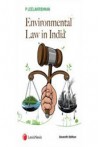- Author(s): P. Leelakrishnan
- Publisher: LexisNexis
- Edition: 7 Ed 2025
- ISBN 13 9788197759024
- Approx. Pages 480 + Contents
- Format Paperback
- Approx. Product Size 24 x 16 cms
- Delivery Time 3-5 working days (within Kerala & South India) (Others 7-9 days)
- Shipping Charge Extra (see Shopping Cart)
...................................................................................................................................................................................................................................
Description
Environmental law in India is growing: growing day by day. New concepts are evolving, Old doctrines are applied and they are applied vigorously. New laws are designed and enacted. The goal of sustainable development., the doctrine of public trust and the precautionary and polluter pays principles are not empty slogans but they turn out to be robust premises on which courts rely to deliver environmental justice to the citizen and the community. They are already embedded and structured into our legal system. Remedies for environmental hazards are tailored into environmental regime in more ways than one. Environmental law is being reinforced by judicial creativity. Both the Courts and the Green Tribunal hold the view that victims of environmental and ecological perils should be rendered timely and suitable compensation. One may say that the State should strictly follow their dicta instead of being negligent, relaxed or complacent. Inclusion of corporate environmental responsibility as a condition for approving a project is a welcome step although the idea is not a panacea of all the evils. Occasions are not rare when environmental questions outstretch their wings beyond the limitations of specific laws. No wonder, the growing environmental jurisprudence examines the problems not only from the angle of shielding environment rights but also from the standpoint of state obligations. On these premises the Apex Court may not find fault with the National Green Tribunal going out of the boundaries of the scheduled legislation. Control of pollution from motor vehicles is one such instance.
...................................................................................................................................................................................................................................
Contents
Chapter 1. Introduction to Environmental Law
Chapter 2. Public Nuisance and Civil Remedies
Chapter 3. Protection of Forest Habitat
Chapter 4. Coastal Zone Management
Chapter 5. Resource Management
Chapter 6. Control of Pollution
Chapter 7. Environment Act
Chapter 8. Constitution and Environment
Chapter 9. Environmental Hazards: Mass Tort Action
Chapter 10. Environmental Litigation and Judicial Review
Chapter 11. Environmental Impact Assessment
Chapter 12. Public Participation in Environmental Decision Making
...................................................................................................................................................................................................................................
Author Details
Professor P Leelakrishnan is PhD in Administrative Law from London School of Economics (LSE). He also taught law at cochin University of Science and Technology for 30 years. As head of the department, Dean and emeritus Fellow in Cochin University of Legal Studies, he has authored several books and research papers. He has had a versatile career as a lawyer, research, writer and professor.
...................................................................................................................................................................................................................................

